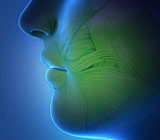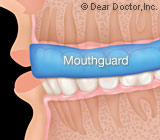 Oral cancer accounts for approximately 3% of cancers in men and 2% in women. That may not sound like a lot, but the disease often isn't detected until it has progressed to its later stages when it's harder to treat and the outlook for survival is significantly diminished.
Oral cancer accounts for approximately 3% of cancers in men and 2% in women. That may not sound like a lot, but the disease often isn't detected until it has progressed to its later stages when it's harder to treat and the outlook for survival is significantly diminished.
The main areas where oral carcinomas (cancers) occur are:
- the tongue (most common location, particularly the sides and underneath)
- the lip (especially the lower one),
- the oral cavity (the mouth), and
- the pharynx (back of mouth and throat).
Risk Factors You Can't Control
Even if you can't change these risks, awareness helps raise your vigilance in order to catch potential problems early when treatment options and positive outcomes are greatest.
- Heredity
- Aging — More than 90% of all oral cancers occur in individuals over 40. However, the incidence among younger people has been on the uptick recently, perhaps related to lifestyle behaviors.
- Race — African Americans have a higher incidence of oral cancer than Caucasians.
Risk Factors You Can Address
- Smoking and chewing tobacco — Smokers are at five to nine times greater risk and snuff and tobacco chewers at about four times greater risk
- Alcohol — Moderate to heavy drinkers are at three to nine times greater risk; the higher the alcohol content, the greater the risk
- Diet — A high intake of fruits/vegetables, which are high in antioxidants, has been found to have a protective effect against a variety of cancers, including oral.
- Chronic sun exposure — Often connected with lip cancers.
- Viral infections — Namely the human papilloma virus “HPV 16,” which has been linked to sexual transmission (oral sex) and cervical cancer in women.
As part of your routine oral hygiene, you should be closely monitoring any non-healing changes in your mouth (e.g., ulcers or sores, white or red patches on the tongue). And rest assured that as part of your regular check-ups, our office performs a comprehensive visual screening for signs of oral cancer.
If you would like more information about oral cancer prevention and detection, please contact Dr. Cindy Sumarauw at 801-281-3500 to schedule an appointment for a consultation. You can also learn more about this topic by reading the Dear Doctor magazine articles “Oral Cancer” and “Diet and Prevention of Oral Cancer.”

 All during February, we are taking part in the celebration of National Children's Dental Health Month. This annual observance is sponsored by the American Dental Association (ADA) to raise awareness of how important it is to develop good oral hygiene habits at an early age. Good dental health will promote your children's overall health and even their performance at school. According to the U.S. Surgeon General, an estimated 51 million school hours are lost per year due to dental-related illness.
All during February, we are taking part in the celebration of National Children's Dental Health Month. This annual observance is sponsored by the American Dental Association (ADA) to raise awareness of how important it is to develop good oral hygiene habits at an early age. Good dental health will promote your children's overall health and even their performance at school. According to the U.S. Surgeon General, an estimated 51 million school hours are lost per year due to dental-related illness. One went over the handlebars of his mountain bike. Another got an elbow going for a lay-up. For a third, it was that tricky maneuver on her new snowboard...
One went over the handlebars of his mountain bike. Another got an elbow going for a lay-up. For a third, it was that tricky maneuver on her new snowboard... Of major importance in all wedding day plans is to ensure that you have your special day captured on film. And it is that fact that influences most brides and grooms to take a long and hard look in the mirror to observe their smiles. Not only do wedding dates motivate many brides and grooms to address concerns regarding their smile, it also serves as the perfect time for their parents to pursue their smile makeover dreams so that they too feel good about themselves in your wedding photos.
Of major importance in all wedding day plans is to ensure that you have your special day captured on film. And it is that fact that influences most brides and grooms to take a long and hard look in the mirror to observe their smiles. Not only do wedding dates motivate many brides and grooms to address concerns regarding their smile, it also serves as the perfect time for their parents to pursue their smile makeover dreams so that they too feel good about themselves in your wedding photos. Once again, it's that time of year when the holiday spirit is in the air: the time when you start hearing those old songs and seeing those pretty lights (not to mention the shopping crowds and the bad weather.) But for lots of us, along with all the good cheer comes a measure of holiday-induced stress. In all the hustle and bustle of the season, could your teeth be suffering from holiday stress too?
Once again, it's that time of year when the holiday spirit is in the air: the time when you start hearing those old songs and seeing those pretty lights (not to mention the shopping crowds and the bad weather.) But for lots of us, along with all the good cheer comes a measure of holiday-induced stress. In all the hustle and bustle of the season, could your teeth be suffering from holiday stress too? The holidays are traditionally a time when friends and family from near and far can get together and make merry. In this joyful season, many folks look forward to re-connecting with old friends… and maybe making new ones. But if you've been hesitant to show your holiday smile because your teeth are less than pearly white — then why not stop fretting: Did you know that your teeth could be dramatically brighter after just one visit to the dental office?
The holidays are traditionally a time when friends and family from near and far can get together and make merry. In this joyful season, many folks look forward to re-connecting with old friends… and maybe making new ones. But if you've been hesitant to show your holiday smile because your teeth are less than pearly white — then why not stop fretting: Did you know that your teeth could be dramatically brighter after just one visit to the dental office? Participating in athletic activities offers numerous well-documented health benefits — not to mention instilling the intangible values of discipline, teamwork and goal-setting. Of course, in nearly every sport, the possibility of injury exists as well. But don't let that stop you or someone you love from playing! Instead, you can learn about the potential hazards of dental injury, and take some practical steps to minimize the risk.
Participating in athletic activities offers numerous well-documented health benefits — not to mention instilling the intangible values of discipline, teamwork and goal-setting. Of course, in nearly every sport, the possibility of injury exists as well. But don't let that stop you or someone you love from playing! Instead, you can learn about the potential hazards of dental injury, and take some practical steps to minimize the risk.